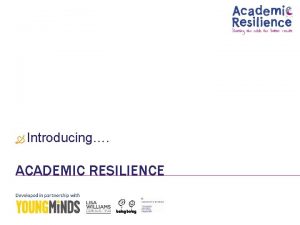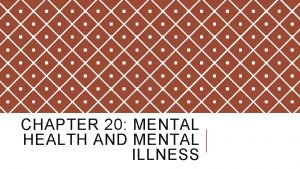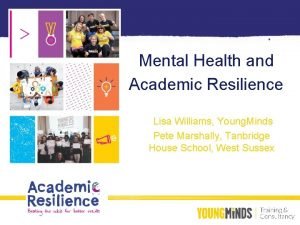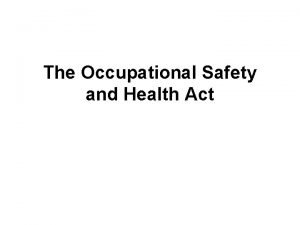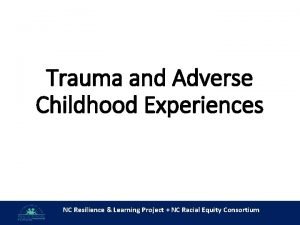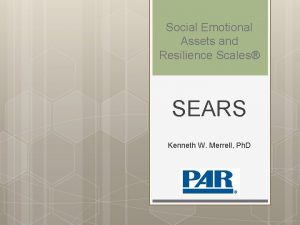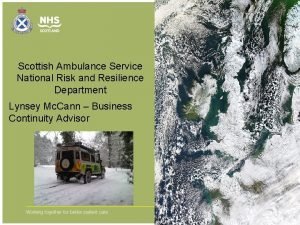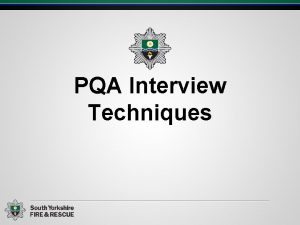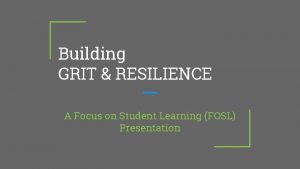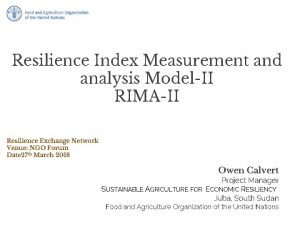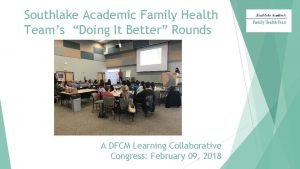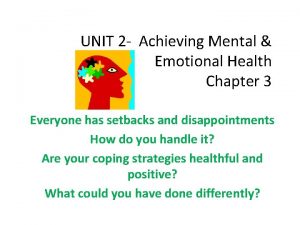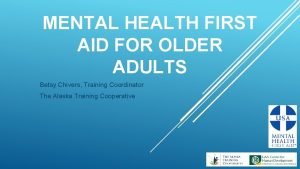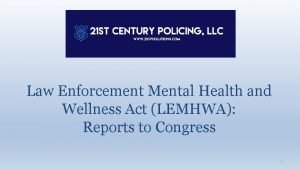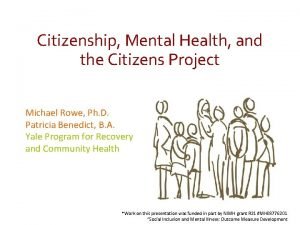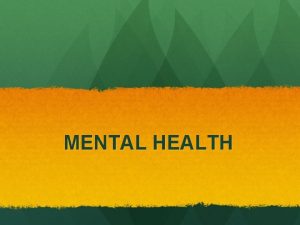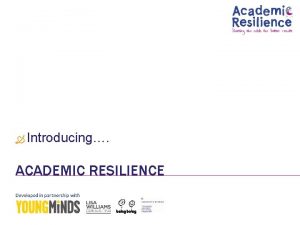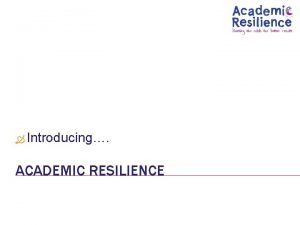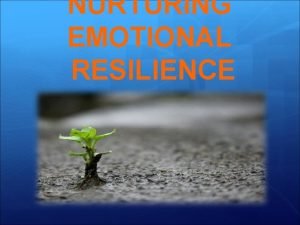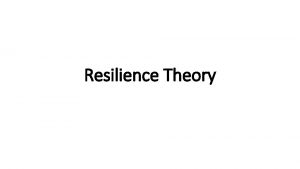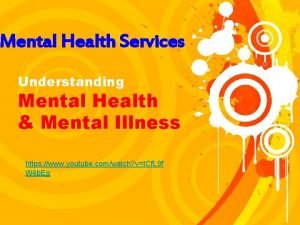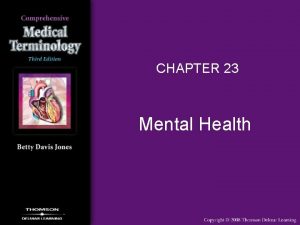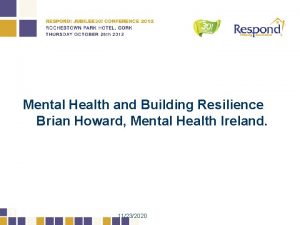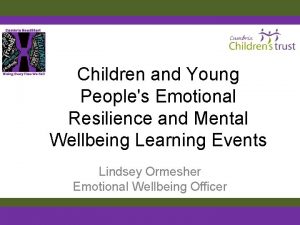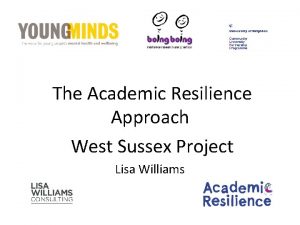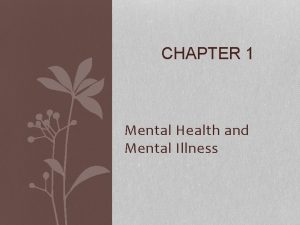Mental Health and Academic Resilience Lisa Williams Young





















- Slides: 21

Mental Health and Academic Resilience Lisa Williams, Young. Minds Pete Marshally, Tanbridge House School, West Sussex

About Young. Minds • UK’s leading charity for children and young people’s mental health and wellbeing since 1993 • National Campaigns e. g. Wise Up for Schools • Training – run training courses for commissioners, professionals, parents and youth workers all over the UK – 6, 700 individuals trained over 237 days • Parent Helpline – provides support to 12, 000 parents and families • Provide research, consultation and engagement work with parents, families and young people for public sector bodies

Today • Children and young people’s mental health • National policy context • Whole school approaches to building Academic Resilience • Example of practice; Tanbridge House School, West Sussex

• Among people under 65, nearly half of ill health is mental illness. • Less than 50% were treated appropriately at the time problems emerged

Latest research • 30, 843 CYP (age 11– 14) - largest schools survey of child mental health and wellbeing in England • 18. 4% experiencing emotional problems, - girls (24. 9%) boys (10. 9%) • 18. 8% exhibiting behavioural problems, - boys (23. 1%) girls (15. 1%) • The odds of experiencing mental health problems increased for: – free school meals – had special educational needs – categorised as a ‘child in need’ – Deighton, J et al. (2018).

Teacher Resilience Extract from TES – 4 th March 2016 relating to teacher mental health A survey of 2000 teachers found 84% had dealt with their own mental health problems in the last 2 years but only 26% of these had spoken to their line manager about it.

In an average class of year 11 pupils…. . 10 will have witnessed their parents separate (Resolution, 2014) 8 living in lone parent households (ONS, 2016) 1 will have experienced the death of a parent (Parsons, 2011) 14 will report having been bullied (Of. STED 2014) Girls been the victim of a sexual offence (Nat. Crime Survey 2 -3 2013/14) will have experienced severe physical violence, sexual 8 abuse or neglect (NSPCC, 2011)

Adverse Childhood Experiences (ACEs)

Where is the line for schools between… What you can/should/ must do? When you need external help? Have we got the right • Every school has different skills and knowledge? challenges; demographics; capacity/experience. • Local community support and local services are different

Green Paper -Transforming Children and Young People’s Mental Health Provision Suggests 1. A mental health lead in every school and college by 2025 2. Mental health support teams working with schools and colleges 3. Shorter waiting times 4. National partnership to improve mental health services for 16 -25 year olds 5. Improve understanding of mental health – research Other actions include; Df. E to update Mental Health and Behaviour in schools Guidance A member of staff from every school to receive mental health awareness training (MHFA) Ofsted currently looking at evidence to inform the development of a new common inspection framework for Sept 2019

Scoping the evidence – links between wellbeing and attainment Key points; 1. Pupils with better health and wellbeing are likely to achieve better academically. 2. Effective social and emotional competencies are associated with greater health and wellbeing, and better achievement. 3. The culture, ethos and environment of a school influences the health and wellbeing of pupils and their readiness to learn. From - The link between pupil health and wellbeing and attainment. (A briefing for head teachers, governors and staff in education settings). Public Health England. 2014

What schools and colleges do Assessments Counselling Additional support Greatest sustainable impact WHAT AND HOW? Buy in ‘expert’ help School’s own culture, capacity and approach Manualised Programmes Work with external agencies Statutory services e. g. mental health services, social care, etc.

Risk and protective factors Risk Factors Protective Factors

Research evidence… • Resilience is highly correlated with academic achievement and educational success (Werner & Smith 1992). • • • Trusted adult Sense of positive belonging Problem solving Hope and aspiration Activities and interests Participation/agency Managing feelings Safe spaces Helping others

ACADEMIC RESILIENCE: OUR DEFINITION Academic resilience means students achieving good educational outcomes despite adversity. For schools, promoting it involves strategic planning and detailed practice involving the whole school community to help vulnerable pupils do better than their circumstances might have predicted.


• Score and collate pupil data to map risk levels, and share more with staff. • As many staff as possible understanding what they can do to build resilience as part of the ‘day job’. X no. High risk (likely known to you already) X no. Medium risk (prevent escalation) X no. Risk indicated (keep an eye on and focus prevention activity here) • Develop school improvement plans and target activity • Get feedback (continuous learning) • Gather insight and ideas from students, Rest of the school (embed Academic staff and parents Resilience culture ) (whole school audit against the evidence base)

Quotes from schools on the West Sussex project • ‘The Pastoral office has become more strategic, not just firefighting and mopping tears. . ’ • ‘In the past it’s been difficult to get people to be mentors. . . After we introduced this, talked about resilience and what students said, 15 teachers volunteered to be mentors!’. • ‘We are on a journey, nowhere near done, but there is definitely a change of attitude and approach to students. Staff are more mindful. ’ • It has definitely changed relationships with staff and some students. There’s fewer pupils blowing up for example, because staff are not pressing buttons, they know them better, so they are better at managing them’. • ‘Resilience is part of the everyday language now in school’

Tanbridge House School, Horsham Pete Marshalley, Assistant Head Teacher

• Insert slides from Pete

C o n t Lisa Williams, Commissioning Support Lead. Email; Lisa. williams@youngminds. org. uk • Pete Marshallsay, Assistant Headteacher, Tanbridge House School • pmarshallsay@ths. uk. net Websites; www. youngminds. org. uk Also www. boing. org. uk
 Academic resilience approach
Academic resilience approach Chapter 20 mental health and mental illness
Chapter 20 mental health and mental illness Young minds resilience
Young minds resilience Verna williams and sam williams
Verna williams and sam williams Mental illness mental health jeopardy
Mental illness mental health jeopardy Andy williams robert williams
Andy williams robert williams Robbie williams janet williams
Robbie williams janet williams Objective of occupational health
Objective of occupational health Wolters kluwer health lippincott williams & wilkins
Wolters kluwer health lippincott williams & wilkins Nc resilience and learning project
Nc resilience and learning project Social emotional assets and resilience scales
Social emotional assets and resilience scales Risk and resilience ambulance
Risk and resilience ambulance What does pqa mean
What does pqa mean Building grit and resilience
Building grit and resilience Resilience index measurement and analysis
Resilience index measurement and analysis Johannes volkelt empathy theory
Johannes volkelt empathy theory Southlake academic family health team
Southlake academic family health team Chapter 3 achieving mental and emotional health answer key
Chapter 3 achieving mental and emotional health answer key Mental health and older adults
Mental health and older adults Law enforcement mental health and wellness act
Law enforcement mental health and wellness act Mental health and older adults
Mental health and older adults Mental health and citizenship
Mental health and citizenship
